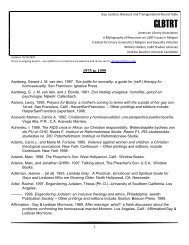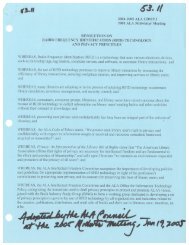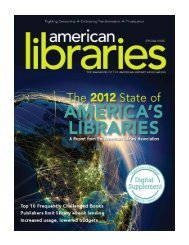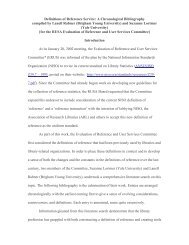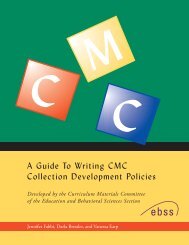The Campaign for America's Libraries - American Library Association
The Campaign for America's Libraries - American Library Association
The Campaign for America's Libraries - American Library Association
You also want an ePaper? Increase the reach of your titles
YUMPU automatically turns print PDFs into web optimized ePapers that Google loves.
<strong>The</strong> graduate student whose thesis on the importance of food in Dickens’ writing was strengthened by<br />
viewing a first edition work that featured food on the cover.<br />
<strong>The</strong> faculty member who just published a book/article to rave reviews in the media.<br />
An innovative project/paper that helped a student get into Grad school.<br />
Dedicated students working in the library who help their peers.<br />
A medical breakthrough supported by library resources/services<br />
We could come up with a lot of these!<br />
I think there are many interesting collections within special collections.<br />
A story about connecting to the community.<br />
Stories like these bring your message to life and put a human face on the library. Whether it’s a budget<br />
presentation or casual conversation, you should be prepared with three stories or examples to help you<br />
connect with your audience. Ideally, these should spark a response from your listeners—“I never knew<br />
that!” “That’s wonderful.”<br />
Sharing your library’s stories in presentations and publications can make a powerful statement about the<br />
value of your library. Profiles of dynamic library staff and what they do can also help bring your library’s<br />
story to life. Suggest profiles <strong>for</strong> the student and faculty publications. You may also feature staff profiles<br />
in the library’s newsletter, annual report, or on the Web page. For examples, see<br />
www.ala.org/yourlibrary. Click on “Academic and Research <strong>Library</strong> <strong>Campaign</strong>” and then “Who We<br />
Are.”<br />
Keep in mind that while a few statistics can help tell your story, a few too many can kill it. Why? Because<br />
most people don’t remember statistics unless they are surprisingly good or bad or translated into stories,<br />
e.g., “Our library receives less than x percent of every dollar spent on educating students [or research].”<br />
“More college students visit our campus library than attend football and basketball games,” or whatever is<br />
true <strong>for</strong> your library.<br />
Suggestions <strong>for</strong> Capturing Stories<br />
Put out a comment box and invite library users to tell how the library has helped them, possibly in<br />
connection with <strong>Library</strong> Lovers Month in February (See www.librarysupport.net/librarylovers) or<br />
National <strong>Library</strong> Week.<br />
Work with the journalism department or library school to engage students in interviewing faculty and<br />
students about how the library makes a difference.<br />
Send notes to well-known campus figures and graduates inviting their comments.<br />
Save and use comments from thank-you notes and survey <strong>for</strong>ms.<br />
At the reference desk we get the best stories and quotes. Librarians should write down the best stories<br />
and use those <strong>for</strong> future use. <strong>The</strong>re does not have to be names.<br />
Stories often can be used without names, although it is best to ask permission to use names <strong>for</strong> publicity<br />
purposes.<br />
Share your library’s best stories with the ALA Public In<strong>for</strong>mation Office and ACRL to use as part of the<br />
national Academic and Research <strong>Library</strong> <strong>Campaign</strong>. Send to atyourlibrary@ala.org or acrl@acrl.org.<br />
8



